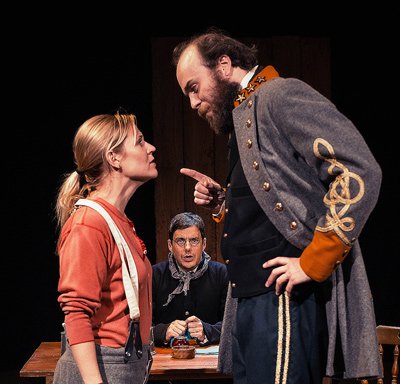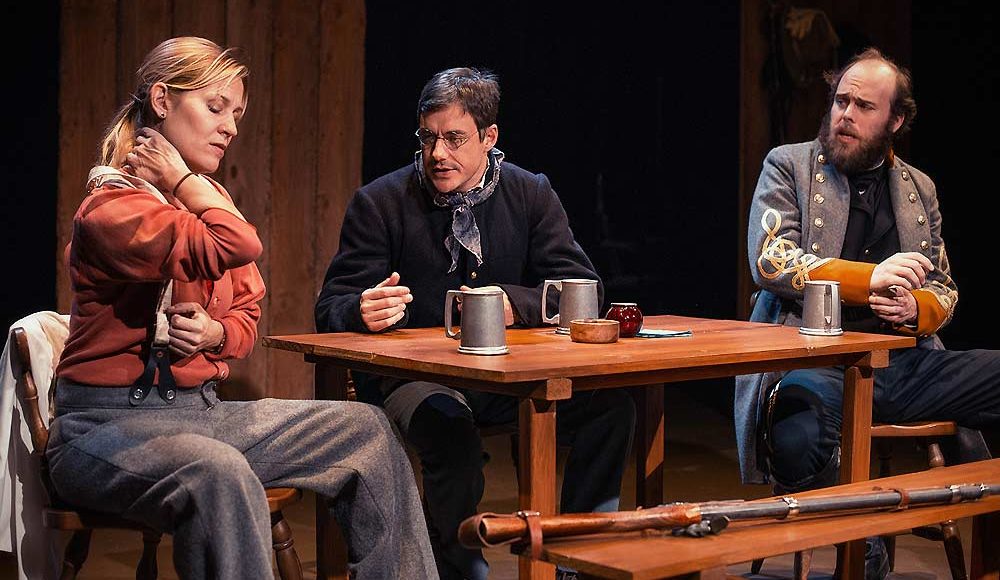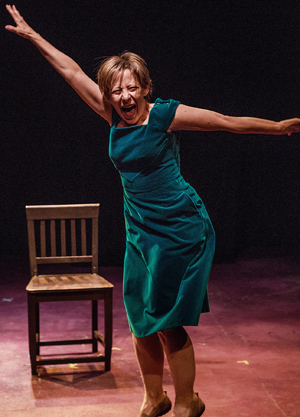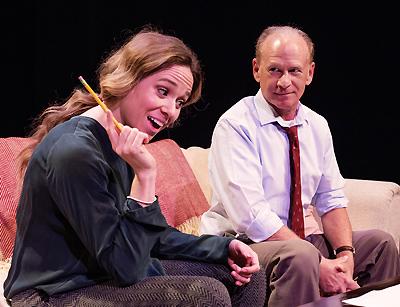The Echo Theater Company is one of the newer jewels in the crown of Los Angeles theatre, and with their current rep staging of Jessica Dickey’s Row After Row and A Small Fire by Adam Bock their gleaming grows more bedazzling.
The two short works demonstrate the exceptional talents the L.A. theatre community brims with, while their selection for staging displays the boldness and breadth this company is capable of.
Growing up just outside of Gettysburg, Pennsylvania, Playwright Dickey is familiar with her setting for Row After Row, as well as its history.
Cal (Ian Merrigan) and Tom (John Sloan) are a pair of local boys and childhood friends. Soon to be a first time father, Tom teaches at a school where a strike threatens to leave him without a way to support his family.

Jennifer Chambers, John Sloan, Ian Merrigan (Photo by Darrett Sanders)
Cal is your basic slacker.
But both are “living historians,” hardcore civil war re-enactors with an obsession for accuracy. Every July they join with the “weekend warriors” descending on Gettysburg for the annual recreation of the three-day battle fought there, that concludes with a restaging of Pickett’s Charge.
Their participation has become a time honored tradition between them.
It’s the time when they try to mend the cracks in their friendship, cracks which seem to grow wider every year.
So, now that they’re done thrilling the tourists for the day, the two of them do an about-face and carry out a tactical retreat back to their favorite watering hole, the traditional site for them to get hammered out of their skulls.
But they are shocked at finding another “soldier” has stolen a march on them and is occupying their booth. And not only is this squatter an obvious “frab”—a newbie to the world of Civil War re-enacting—but worse, he’s a she!
Leah (Jennifer Chambers) is a former dancer just down from New York.
Right out of the gate Cal starts in at her, explaining through clenched teeth, how back in 1863 it was sorta rare to come across a Union soldier who wore a nose ring.
Leah responds to Cal and you know for a fact she didn’t forget to pack the chip on her shoulder. What ensues is a skirmish of taunts, jeers and japes.
It is at this point, that a number of reviewers have voiced the opinion Dickey should have left things standing. That it would have been better to leave her play just this little comedy about quirky people living their quirky little lives. And it seems to have really annoyed them that rather than remain in this snug little buttonhole, Dickey chose to attempt something more ambitious.
Suddenly, at this junction, dissonant ideas start to pop up in the play, thoughts out of sync with Dickey’s lighthearted banter.
Scenes shift in time. The re-enactors had mirrored history, now history is mirroring the re-enactors. As darker tones emerge, director Tara Karsian deftly cranks up the play’s tempo to a pace somewhat akin to a game of “Whack a Mole.”
Dickey is fortunate to have Karsian at the helm and to have in Merrigan, Sloan and Chambers a solid cast. They meet the demands of their roles with such aplomb that you wish the playwright had given them more to do.
Now I am a history junkie of the first order.
So trust me, I know when a work of a historical nature is maintaining authenticity within its artistry (Abe Polsky’s Custer’s Last Band).
I also know, better than most it seems, when a play is a fraudulent piece of dreck that has bamboozled audiences due to their historical ignorance (Matthew Lopez’s The Whipping Man).
What is impressive about Dickey’s short work is not her faithfulness in detailing the minutiae of history, but her audacity in uprooting that history in order to scrutinize the present.
In doing so, she attacks the prevailing concept of history as a thing separate and distant from us, a delusion that becomes a refuge, excusing our fault of complicacy which inevitably stagnates into the sin of complicity.
When one lives in a historical environment you are awakened to the reality, that in every action, every choice, every refusal, we contribute to the history that is yet to be.
History is our creation as we are history’s.
Now Dickey’s play is far from perfect, but anytime a playwright displays originality, taking risks others might shy away from, they are to be applauded, and not to be reprimanded that they should have played it safe.
Caution is overrated.
In the timeless tale of Icarus’ flight and the fate he suffered for it, the father of Icarus played it safe.
What was his name?
* * *
A Small Fire by Adam Bock is the stronger play of the two by far, and Alana Dietze scores a striking directorial debut by availing herself of every droplet of the piece’s potency with a skilled proficiency.
Bock has played an interesting game here. Whether in doing so he sought to challenge his audience or himself, is uncertain but irrelevant. For in this instance, the game is well worth the candle.
He has, in a fashion, devised a chess board with but two squares, a small white one and a much larger very, very black one. Next he proceeds to place all five of his game pieces on the same square. While none of them act in accord with any others, neither are they opponents. Their adversary is the other square.
Doesn’t sound like much of a game, but it’s one we all must play.
And we will all lose to that seemingly empty, very black, very vast, square.
Emily (Lily Knight) is a pint-sized panzer tank who has plowed over the barbed wire and blockades of sexism to seize and occupy territory in the manly domain of the construction business.
She is a force to be reckoned with, dictating terms to her well-meaning but milquetoast husband John (Michael Mantell) or riding roughshod over her crew foreman Billy (Stephen O’Mahoney).
The only one capable of standing up to Emily is her daughter Jenny (Mackenzie Kyle), who refuses to allow her mother to usurp the planning of her upcoming wedding.
One night as Emily bellows about their future son-in-law (“I don’t have to be happy that my daughter is marrying a guy who imports cheese.”) John, inexplicably agitated, suddenly rushes from the room.
A pot Emily has left simmering on the oven, broke out into a small fire that John rushed to extinguish. John had smelled the smoke.
Emily didn’t.
And so Emily’s game begins.
We never learn the identity of her affliction but, slowly, it brings about her deconstruction. Her sense of smell first, her sight follows, then her hearing, all stripped away. Like an onion she is peeled layer by layer.
Emily and those about her are suddenly at sea and rudderless on the arcing waves of the approaching storm.
There is no conflict among the characters strictly speaking; they only grind against one another in passing. “You just don’t know what to do,” laments one.
In most cases, for a playwright to purge conflict from his characters’ interaction would assure ruin, but Bock subtly shifts it elsewhere, focusing it on that which is unknown.
Yes, that great unknown of such terror to us, but also that lesser unknown, that unknown within ourselves where the terror experienced is intimate and muted.
That other square, the black one.
Square, yes, but mirror as well.
In facing death we perceive the clearest, most honest reflection of ourselves. And discoveries are there to be made. Some we welcome, some we don’t.
Bock conjures up revelations for his characters which thunder with resonance.
He brings forth what is unexpected, weakness where you thought there was strength, depth in what you took for shallow.
What he reveals never rings false, perhaps because the story he’s telling is one he’s lived; or perhaps it’s because he’s a skilled and gifted playwright.
Perhaps it’s both.
In a work full of scenes rooted in the genuineness of its humanity, three stand out:
There is the wedding of Emily and John’s daughter, by which time Emily is imprisoned by her own infirmities, and in that prison she dances.
The most telling is between John and Billy, two men shown to be more than the audience first thought. Two men with little in common, who weave an unbreakable bond from their fear of pending loss, while celebrating flight.
It is Billy who shares the wisest counsel of the play. Counsel of what can be done when facing the adversity common to all: “You gotta learn to live a little bigger than you think you can.”
Then there is the final scene….
The small cast is excellent; Knight from the Odyssey ‘s A Delicate Balance and Antaeus’ Crucible is always memorable; Mantell will be remembered from the worthy Broadway Bound also at the Odyssey; O’Mahoney added his luster to The Fountain’s The Normal Heart.
Only Kyle is unknown to this reviewer. It seems she’s an actress from Chicago, but she’s definitely a keeper.
Both shows gain by the efforts of scenic designer Amanda Knehans and Michael Mullen’s costumes.
Matt Richter’s light design also contributes its fair share to Row After Row, but it’s in A Small Fire where his artistry fuels the poignancy of the closing of the piece.
In those last moments a small fire is found still burning.
One small heartbreaking flicker of flame soon to be swallowed in the cavernous darkness, yet while light remains humanity and hope blaze.
The Echo Theater Company’s Row After Row and A Small Fire go see.
(All Photos by Darrett Sanders)








